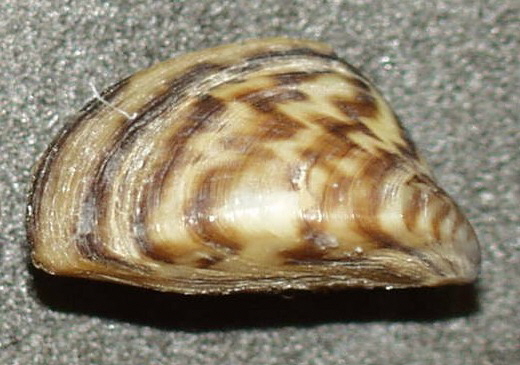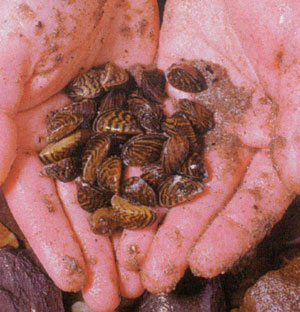Zebra Mussels
Unfortunately, zebra mussels
were found in Pelican
Lake last fall.
Zebra mussels are an invasive species that has been spread throughout
Minnesota Lakes , including Mille Lacs and the Alexandria area lakes. Zebra mussels
are ¼ to 1 ½ inches long and are D-shaped with alternating black and brown
stripes. Zebra mussels are tricky to find when they are larvae, because they are
not visible to the naked eye. The larvae can live in your live well if
there is water there, and then spread into other lakes. Zebra mussels can
attach to hard surfaces such as boat lifts and docks and clog water intake
pipes.
Unfortunately,
there is no remedy for Zebra mussels. There is no chemical treatment available
to control them. The best we can do is prevent them from spreading to other
area lakes.
There are some
new regulations that apply to
Pelican
Lake now that it contains
zebra mussels (http://www.dnr.state.mn.us/eco/invasives/laws.html):
·
taking wild
animals (fish, frogs, crayfish, etc.) from infested waters for bait or aquatic
farms is prohibited;
·
equipment used
for commercial fishing purposes in infested waters must be dried or frozen
before it can be used in noninfested waters (misdemeanor);
·
water from
infested waters may not be used to transport fish except by permit;
·
persons leaving
infested waters that contain populations of spiny waterflea or zebra mussels
must drain bait containers, other boating-related equipment (excluding marine
sanitary systems) that holds water, and livewells and bilges by removing the
drain plug before transporting the watercraft and associated equipment on public
roads ($50 civil penalty or misdemeanor);
·
water from
infested waters may not be transported on a public road or off riparian property
on infested waters except in emergencies or under permit ($200 civil penalty or
misdemeanor).
Is your
boat protected against zebra mussels?
 Do
you know what to do? Unfortunately, some boat owners will see and feel the
damage caused by zebra mussels first hand. Their boat hulls can be damaged and
their motors can overheat because they do not know how to minimize the impacts
zebra mussels can cause. These small invasive mussels attach to hard surfaces
including boats and motors! There are simple and proactive steps owners may
implement to protect their investment and prevent the spread of invasive species
into more of Minnesota's waters.
Do
you know what to do? Unfortunately, some boat owners will see and feel the
damage caused by zebra mussels first hand. Their boat hulls can be damaged and
their motors can overheat because they do not know how to minimize the impacts
zebra mussels can cause. These small invasive mussels attach to hard surfaces
including boats and motors! There are simple and proactive steps owners may
implement to protect their investment and prevent the spread of invasive species
into more of Minnesota's waters.
Proper boat hull, engine maintenance and
cleaning are key to saving thousands of dollars in repair costs resulting from
damage caused by zebra mussels. Juvenile and adult zebra mussels have the
ability to attach to many different types of substrate including fiberglass,
aluminum, wood, and steel. This ability to attach decreases fuel efficiency and
damages the boat’s finish. Their larvae (called veligers) are extremely small –
too small to see without a microscope. When veligers are present in the water
they can be drawn into engine passages or can move into them on their own. Once
they settle out in the engine cooling system, they can grow into adults and may
block intake screens, internal passages, hoses, seacocks, and strainers. The
best ways in which boat owners may avoid this type of damage are:
·
Use a boatlift
to completely remove the watercraft from the water.
·
Use your boat.
If boats are left moored in zebra
mussel infested waters run the engine at least twice a week at slow speeds
(about 4-½ mph) for 10 to 15 minutes. The hot water will kill the zebra mussels
in your engine’s cooling systems. Keep an eye on your engine temperatures – if
you notice an increase, it may mean that zebra mussels are clogging your cooling
system.
·
Lift the motor
out of the water between uses if mooring.
By lifting the motor out of the water you will
reduce the chances of zebra mussels colonizing the intake grate.
·
Tip down the
motor and discharge the water when leaving a waterbody.
This will reduce the chances of zebra mussels
being carried to a new location in the trapped water.
·
Motor “muffs”,
also known as motor flushers, are another tool designed to remove zebra mussels
and other materials from your boat engine or personal watercraft.
Motor “muffs” flush away soil particles and
other foreign materials, preventing clogging, corrosion and helping to
extend the life of your engine.
·
Rinse boat and
equipment. Adult zebra mussels should
be removed from your boat, trailer, and equipment by hand (whenever possible)
and discarded in the trash before rinsing the boat. Boats and equipment may be
pressure washed to remove veligers and juvenile zebra mussels.
·
Apply
antifouling paints to the hull and the engine’s cooling system. In-line
strainers can also be installed in
the engines cooling system.
 Adult
zebra mussels can be carried to new water bodies when attached to boats and
plant fragments.
Adult
zebra mussels can be carried to new water bodies when attached to boats and
plant fragments.
Veligers can be transported in water.
Please take the following steps to prevent
the transport of zebra mussels and other aquatic invasive species to new waters:
·
Inspect
and remove aquatic plants, animals,
and mud from your boat, trailer, and equipment.
·
Drain
all water from your motor, livewell, bilge,
transom, etc.
·
Dispose
of unused bait in the trash.
·
Wash
your boat and equipment with hot and/or high
pressure water, particularly if moored for more than one day, OR
·
Dry
your boat and equipment thoroughly (in the
sun) for five days.
Information Sources:
Minnesota
DNR, Wisconsin DNR
 Do
you know what to do? Unfortunately, some boat owners will see and feel the
damage caused by zebra mussels first hand. Their boat hulls can be damaged and
their motors can overheat because they do not know how to minimize the impacts
zebra mussels can cause. These small invasive mussels attach to hard surfaces
including boats and motors! There are simple and proactive steps owners may
implement to protect their investment and prevent the spread of invasive species
into more of
Do
you know what to do? Unfortunately, some boat owners will see and feel the
damage caused by zebra mussels first hand. Their boat hulls can be damaged and
their motors can overheat because they do not know how to minimize the impacts
zebra mussels can cause. These small invasive mussels attach to hard surfaces
including boats and motors! There are simple and proactive steps owners may
implement to protect their investment and prevent the spread of invasive species
into more of  Adult
zebra mussels can be carried to new water bodies when attached to boats and
plant fragments.
Adult
zebra mussels can be carried to new water bodies when attached to boats and
plant fragments.